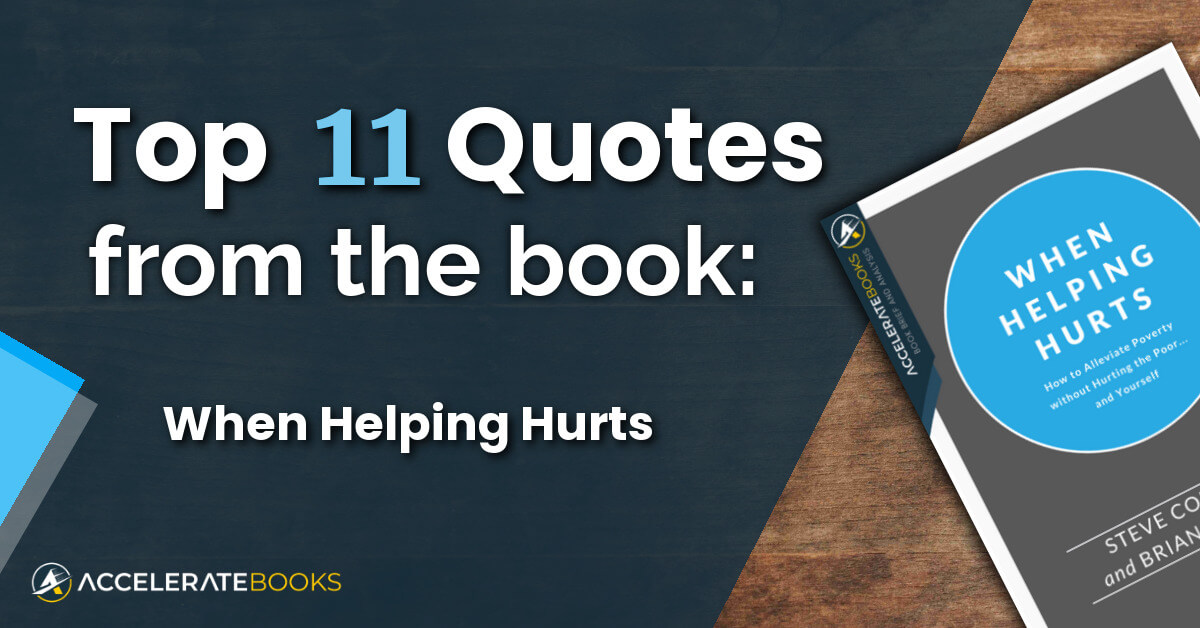- AccelerateBooks
- Book Summaries
- Top 11 Quotes From When Helping Hurts
Top 11 Quotes From When Helping Hurts
We collected some of the most insightful quotes that caught our attention as we read the book When Helping Hurts by Steve Corbett, Brian Fikkert

By the Accelerate Team
Published: September 6, 2022
Last updated: September 6, 2022
Steve Corbett is the community development specialist for the Chalmers Center for Economic Development and an assistant professor in the Department of Economics and Community Development at Covenant College. Previously, Steve worked for Food for the Hungry International as the regional director for Central and South America and as director of staff training. Steve has a B.A. from Covenant College and a M.Ed. in adult education from the University of Georgia.
Dr. Brian Fikkert is a professor of economics and the founder and president of the Chalmers Center at Covenant College. Dr. Fikkert earned a Ph.D. in economics from Yale University, specializing in international economics and economic development. He has been a consultant to the World Bank; he is the author of numerous articles in both academic and popular journals and co-author of five books. Prior to coming to Covenant College, he was a professor at the University of Maryland – College Park and a research fellow at their Center for Institutional Reform and the Informal Sector.

1.
“How useless it would have been if Jesus had only used words and not deeds to declare the kingdom!”
Steve Corbett, Brian Fikkert Tweet
CLICK TO SHARE
2.
“Converts need to be trained in a biblical worldview that understands the implications of Christ’s lordship for all of life and that seeks to answer the question: If Christ is Lord of all, how do we do farming, business, government, family, art, etc., to the glory of God?”
Steve Corbett, Brian Fikkert Tweet
CLICK TO SHARE
3.
“Being made in God’s image, human beings are inherently relational...before the fall, God established four foundational relationships for each person: a relationship with God, with self, with others, and with the rest of creation.”
Steve Corbett, Brian Fikkert Tweet
CLICK TO SHARE
4.
“In particular for our purposes, when these relationships are functioning properly, people are able to fulfill their calling of glorifying God by working and supporting themselves and their families with the fruit of that work.”
Steve Corbett, Brian Fikkert Tweet
CLICK TO SHARE
5.
“A helpful first step in thinking about working with the poor in any context is to discern whether the situation calls for relief, rehabilitation, or development.”
Steve Corbett, Brian Fikkert Tweet
CLICK TO SHARE
6.
“One of the biggest mistakes that North American churches make — by far — is in applying relief in situations in which rehabilitation or development is the appropriate intervention.”
Steve Corbett, Brian Fikkert Tweet
CLICK TO SHARE
7.
“The mission of Jesus was and is to preach the good news of the kingdom of God, to say to one and all, ‘I am the King of kings and Lord of lords, and I am using My power to fix everything that sin has ruined.”
Steve Corbett, Brian Fikkert Tweet
CLICK TO SHARE
8.
“Defining poverty is not simply an academic exercise, for the way we define poverty — either implicitly or explicitly — plays a major role in determining the solutions we use in our attempts to alleviate that poverty.”
Steve Corbett, Brian Fikkert Tweet
CLICK TO SHARE
9.
“Poverty is rooted in broken relationships, so the solution to poverty is rooted in the power of Jesus’ death and resurrection to put all things into right relationship again.”
Steve Corbett, Brian Fikkert Tweet
CLICK TO SHARE
10.
“If they need help, give it; but if they do not, your giving may do harm.”
Steve Corbett, Brian Fikkert Tweet
CLICK TO SHARE
11.
“Asset-based approaches to poverty alleviation should not be seen as denying the fact that low-income people — like all of us — have glaring needs. Some of these needs emanate from their personal sins; some result from unjust social, economic, political, and religious systems; and some have come from natural disasters resulting from Adam and Eve’s sin.”
Steve Corbett, Brian Fikkert Tweet
CLICK TO SHARE
Recent Book Summaries
Follow Us
Get access to Key Insights distilled from the best books on Christian Living, Church & Ministry, Culture & Social Issues, Evangelism & Missions, Leadership, and more.














